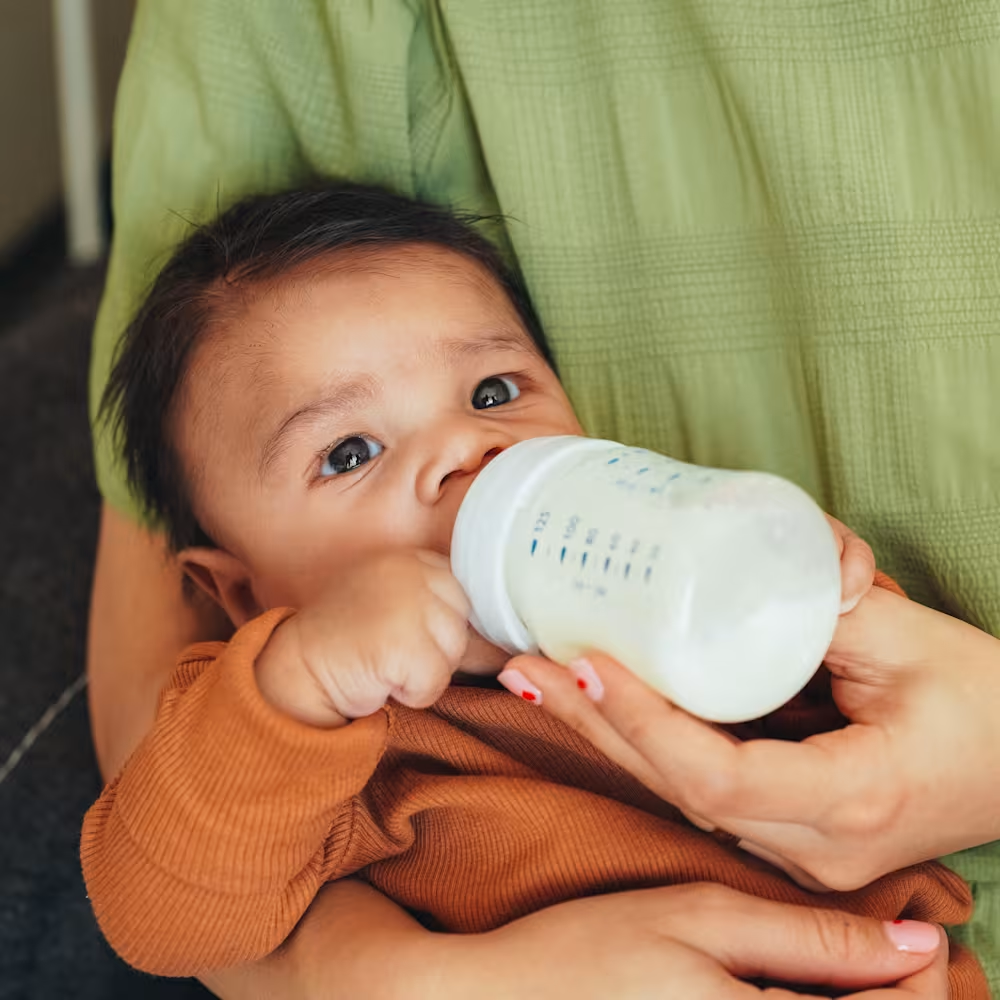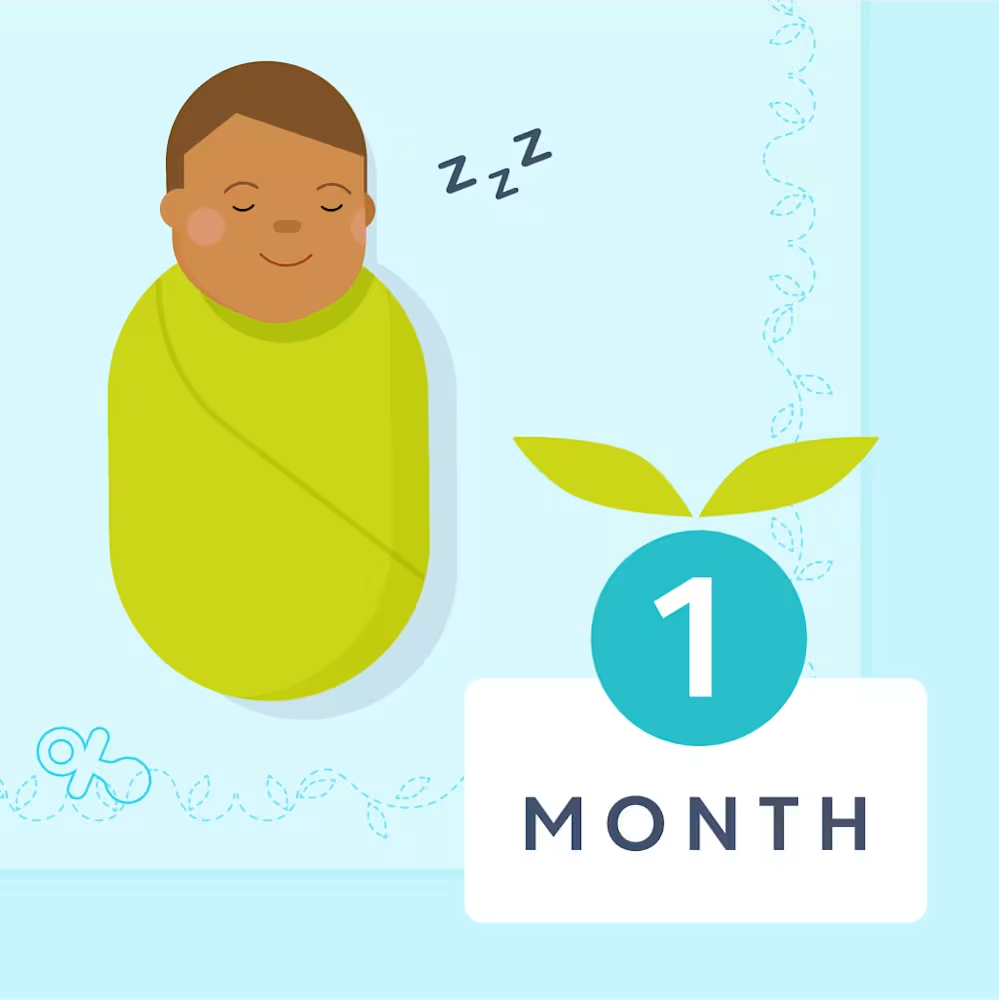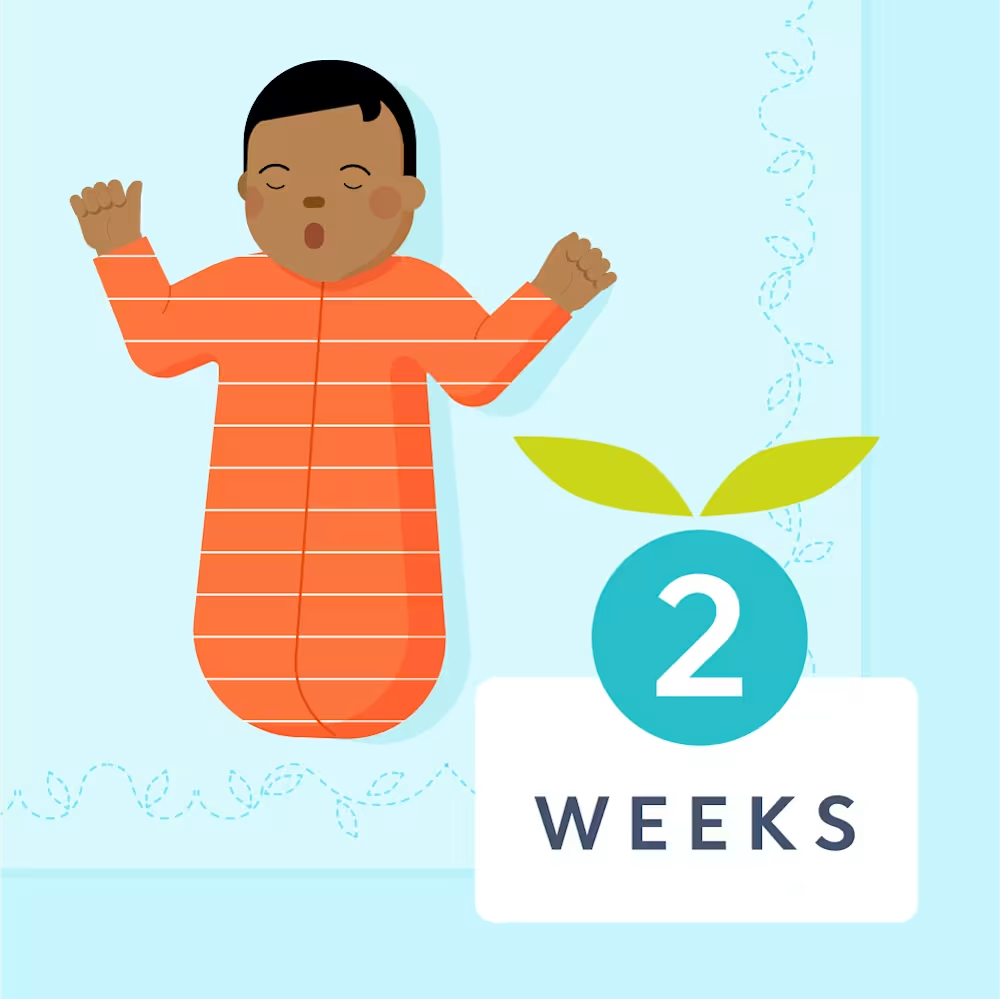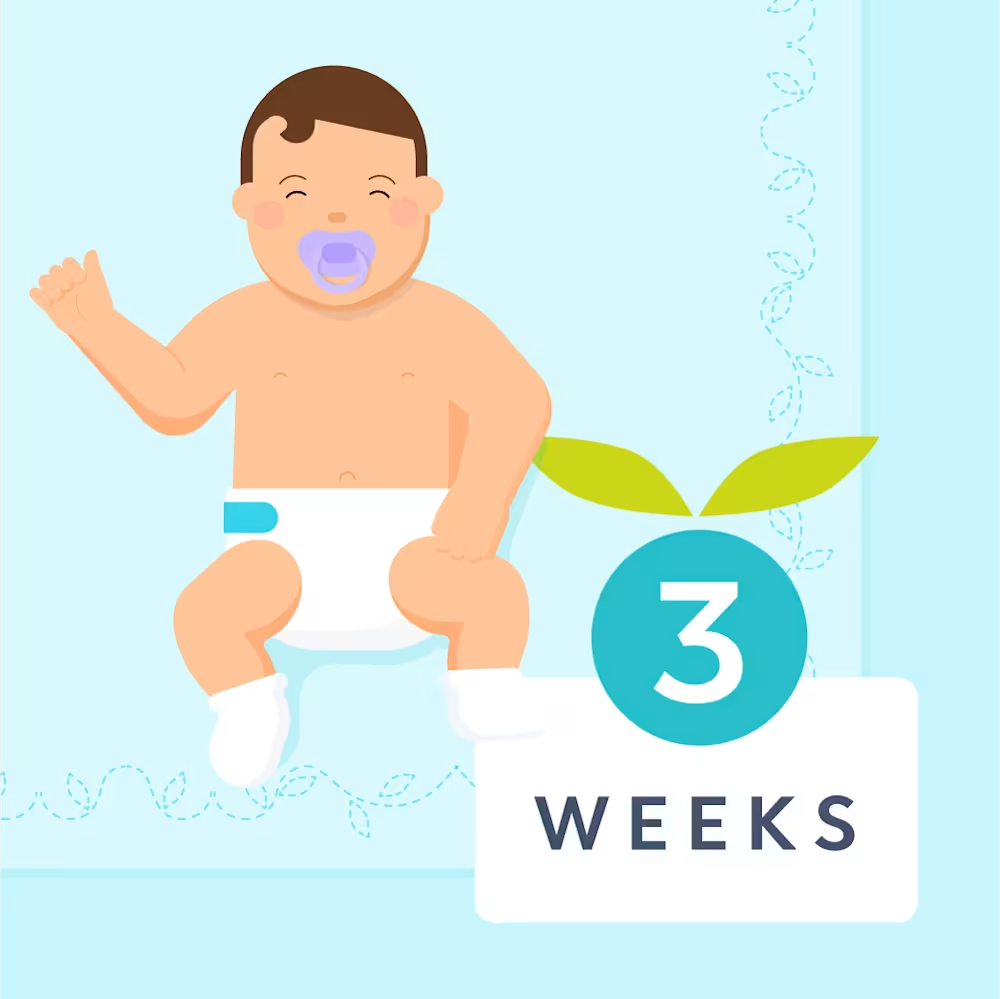2 - 3 week old baby feeding schedule: How much should they eat?
Updated Jan 02, 2026

At 2 - 3 weeks old, your baby is still a newborn and everything is, you guessed it, new! While this is exciting, it can also be exhausting and fraught with worry. But have no fear — we’ve got you covered when it comes to feeding your 2 - 3 week old baby. In this article, we’ll let you know how much your little one may eat at this age, give you tips for feeding your newborn, and answer frequently asked questions about 2 - 3 week old eating expectations.
2 to 3 week old baby sample feeding schedule
At 2 - 3 weeks old, the American Academy of Pediatrics [] recommends babies are fed “on demand,” recommends babies are fed “on demand,” meaning parents should watch their baby for hunger cues, rather than feed solely by the clock. Most babies will look to feed about every 2 - 3 hours, which equates to around 8 - 12 times in a 24-hour period.
Hunger cues at this age could look like:
Opening and closing mouth
Turning head side to side (also called “rooting”)
Bringing hands or fingers to mouth
Increased restlessness
Stretching or moving arms and legs
Remember every baby is different and it’s normal if your little one’s eating times vary. You will want to be sure your baby is eating at least every 3 hours in order to reach the minimum of 8 times in a 24-hour period. Always consult your medical provider or a lactation consultant if you have any questions or concerns.
Similar to feedings, their sleep times will differ too! At this age, sleep and feeding are very intertwined — it’s common for babies to wake because they’re hungry. Don’t worry: it won’t last forever.
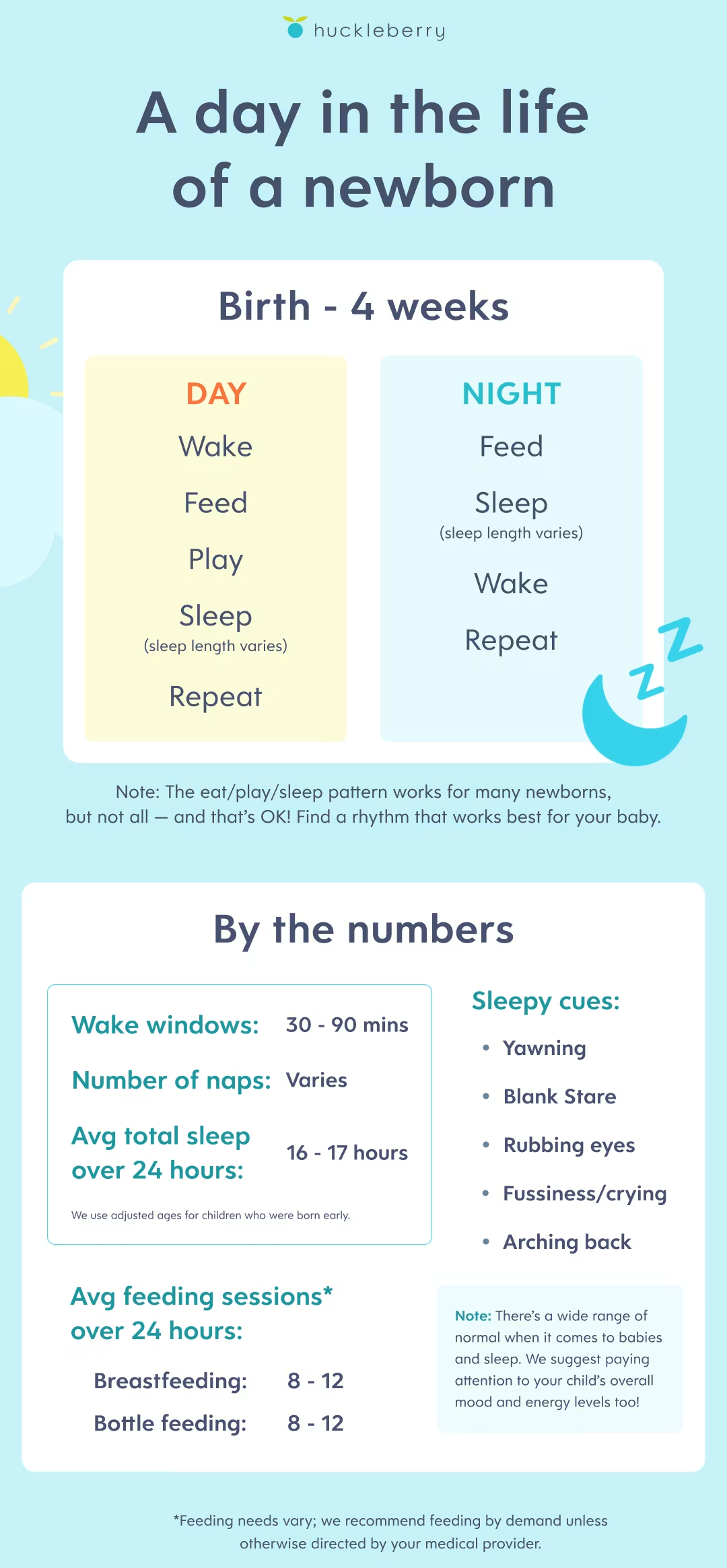
How much to feed a 2 to 3 week old
Within this range of 2 - 3 hours, formula-fed babies can typically go longer between feedings than breastfed babies. This is simply because breast milk digests faster than formula, leaving babies with tiny stomachs feeling hungrier faster. At this age, babies will typically drink 2 - 3 ounces per feeding. Remember your baby’s stomach is the size of a small apricot, so they require frequent but small feedings.
Common feeding challenges for 2 to 3 week old babies
Welcome to the “we’re figuring each other out” phase. Feeding can feel like a mix of sweet moments and total mysteries at this point. Around this time, many babies start eating more often, have days that feel like an all-you-can-eat buffet, and test your patience (and arm strength) with longer or fussier feeds. You’re not doing anything wrong. Their tiny bodies are growing, and you are learning their feeding language.
Typical challenges with feeding newborns may include:
Cluster feeding is still the norm as your baby adapts to life on the outside and grows quicker than you can imagine.
The first big growth spurt happens around 3 weeks, which brings sudden spikes in hunger and more frequent feeding sessions.
Sleepy feeder moments are common at this age. Baby might nod off in the middle of a meal and make it tricky to get in a full feeding.
Fussiness from gas or reflux can be a hurdle with newborns. You can always try paced bottle feeding or pausing nursing for burps if this becomes an issue.
When to introduce a bottle to a newborn
Some babies will take a bottle from birth seamlessly if you are using formula or pumping. Others might only eat from the breast in those first few weeks. In that case, you might be wondering about when to introduce a bottle to your newborn if you haven’t already.
Once your baby is back to their birth weight and nursing is going smoothly, it may be a good time to add a bottle. For many families, around 3 weeks can be a sweet spot. It’s late enough that breastfeeding is well established, but early enough that your baby is still open to learning a new way to feed.
5 tips for feeding your 2 to 3 week old baby
Tip #1: Stick to breast milk or formula
Breast milk, formula or a combination of both provides your baby with all the nutrition they need for the first several months of life. The World Health Organization [] recommends introducing additional food or water at around 6 months of age.
Tip #2: Follow baby’s hunger cues
The most reliable way to build a at 2 - 3 weeks old is to follow your baby’s hunger cues. Signs of hunger include:
Baby licking lips
Putting their hand to their mouth
Opening their mouth, sticking their tongue out
Attempting to suck on anything nearby
Crying is a late signal of hunger and may make it hard to settle down and eat, so watch for those clues early on!
Tip #3: Watch diapers to assess intake
Many parents wonder if their newborn is eating enough, especially if they are nursing. The best way to determine if your baby is eating enough is to watch their diapers. A 2 - 3 week old baby who is drinking enough should have at least 6 wet diapers in a 24-hour period. At least 2 - 3 poop diapers are typical at this age, too. Check with your child’s pediatrician if you’re seeing fewerdiapers or have concerns about how much your newborn is eating.
Tip #4: Consider vitamin D supplements
According to the American Academy of Pediatrics [], all babies less than 12 months old should receive 400 IU of vitamin D each day (unless formula-fed babies consume 32 ounces of infant formula per day).
Tip #5: Know schedules may vary
Wouldn’t it be nice if babies were a bit more predictable?! Since they typically aren’t, it’s best to set your expectations accordingly. Keep in mind that a 2 - 3 week olds’ feeding schedule will fluctuate from time to time. Many babies eat more and more frequently during. Some may also go through periods of cluster feeding where they eat more frequent, yet potentially smaller meals for part of the day.
With the free, you can track your newborn’s feedings and sleep, which may help you identify patterns and more easily navigate this period of unpredictability.
Night feedings at 2 to 3 week olds
Night feedings for a 2 - 3 week old baby are essential. Babies at this age have tiny tummies — roughly the size of a small apricot — so they can’t hold very much. Stomach size combined with how rapidly newborns grow means they need to be fed around the clock to stay hydrated and keep their energy levels up. It’s expected that newborns will wake frequently overnight to eat and for comfort, as their, and they typically sleep in short cycles of 2 - 4 hours between feeds at night.
Takeaway
Feeding takes up a lot of time when you have a 2 - 3 week old baby. And for good reason: they need to eat frequently to grow and develop, which are a baby’s most important jobs!
One of the best things you can do at this age is get to know your baby and their hunger cues. Feed on demand, keep an eye on wet diapers in a 24-hour period, and do your best to enjoy the sweet bonding time that feeding can bring.
Expect that your baby’s feeding schedule will ebb and flow during this time. Changes in appetite, illness, discomfort or distraction may all impact how your baby feeds. Remember, it’s all a normal part of the learning process!
Share article:
Note: The content on this site is for informational purposes only and should not replace medical advice from your doctor, pediatrician, or medical professional. If you have questions or concerns, you should contact a medical professional.
5 Sources
Share article:
